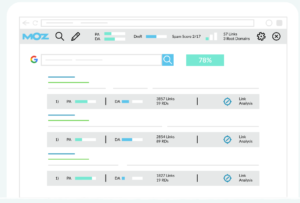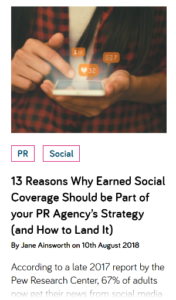Digital PR: The Eight Questions We Are Always Asked
A few years ago, no one was searching Google looking for information on digital PR. This year, thousands of people have typed that phrase into their search bar, with no sign that interest is set to dwindle any time soon. Certainly, from our perspective, we’ve had more digital PR enquiries during the last five months than we had over the previous five years.
So, what is digital PR? Who needs it and why?
We’ve collated all of the questions we’ve ever been asked, and all of the answers we’ve ever given, in our ‘Guide to Digital PR’. If we’ve missed anything, or if you want to know more, please don’t hesitate to get in touch!
1. What is Digital PR?
In a nutshell, digital PR is a tactic used by brands to improve their online presence and performance. This could be through influencer marketing, online news coverage, earned social shares, guest blogging or content marketing.
2. Why is Digital PR Needed?
For the most part, brands approach us for help with their digital PR strategy because they need to improve their rankings on search engines. They’ve done all they can ‘on-page’ (have keyword optimised the content, added plenty of internal links, sorted the title tags and alt tags), but are still ranking behind their competitors for their chosen keywords and phrases.
Invariably, this is because the competition’s website has a higher domain authority (DA) than theirs. Google basically sees the competitor’s website as a better, more credible resource for its searchers.
That’s almost certainly because the competitor’s website has more sites linking to it, and not just any site – those with a high DA, ideally of 40 or more. This means news sites – BBC, MailOnline, Buzzfeed, UNILAD, LADbible to name but a few. For B2B businesses, top-end trade titles can be equally effective.

3. How Do I Know if I Need Digital PR Services?
If your business would benefit from ranking higher on search engines, there’s a fair chance that working with a digital public relations agency would be of benefit. However, you do have to get the on-page elements right first. There are a host of plugins that will give you an idea of how well designed and written your website is, and what you need to do to improve it – we like Yoast.
Lots of SEO companies will also conduct a free audit for you too, in the hope of securing some business now or in the future.
The next step is to find out the domain authority of your website versus the competition. The quickest way is to download the free MozBar. This is the industry’s leading SEO toolbar which gives you instant metrics while viewing any page or SERP.

Moz offers a long list of other insights and tools, but these will require a subscription. If you want to find out where your competitors have backlinks from, try SEMrush’s Backlink Analytics tool.
In short, if you have a lower domain authority and fewer backlinks than the competition, speaking to a digital PR company could well be worthwhile.
4. Is Digital PR Just About Backlinks?
Digital PR and SEO are intrinsically linked, but online public relations isn’t just about backlinks. There are many other benefits to increasing your digital footprint – building brand equity among target audiences being one, boosting brand awareness another, and increasing traffic, trust, credibility and conversion rates some more.
You can read more about the benefits of influencer marketing in particular here, and the importance of earned social coverage here.

5. How Do You Get Backlinks From High Domain Authority Websites?
People might tell you that backlinks are down to relationships with journalists and that you just need to ask for them. Well, we have been building relationships with the media for more than 25 years and have developed an excellent rapport with hundreds of key contacts. Very, very few would give us a backlink just to be kind.
Securing backlinks isn’t easy. Media owners want to increase dwell time on their website to boost ad revenue, not drive their hard-earned visitors elsewhere.
In our experience, if you want to secure a backlink from a key title, the story has to make more sense to the reader with one – like a job application, competition, quiz or offer. Creativity is key, as are contacts, research, insight, great content and perseverance.
For inspiration, you can find a summary of some of our most successful link-building campaigns here.
6. Do I Need a Specialist Digital PR Firm?
The answer to this is yes, and no. Many good, forward-thinking PR agencies will be digital PR agencies by default. They will know how to secure online coverage and have a heap of experience in influencer marketing campaigns. Most will be able to help grow your digital footprint; fewer will know how to translate online coverage into link-building strategies.
So, when compiling a shortlist of digital PR agencies (or just PR agencies), make sure you ask to see examples of their link-building work and what sort of backlink conversion rate they would expect to see. We usually set a 30% target but have often seen campaigns deliver well over 50%, and even over 90% on occasion.
Ascertain how the team would go about securing backlinks, and what sort of return you would get on your planned investment. Use the MozBar to look at the impact they have made on the clients they represent. Investigate where their clients’ links are coming from too (via SEMrush).
Also check out their wider integrated digital credentials – are they Google Partners? Are they account managed by the major social media platforms? Is their team made up of both creative minds and technical experts?
7. Can’t My SEO Agency Just Handle the Digital PR?
Very possibly. There are many brilliant digital marketing/SEO agencies out there which have a great track record in link building and earned media. Others don’t and, interestingly, many companies approach us because their technical agencies have actually recommended they find a specialist online PR agency. They know their limitations.
Again, if you are thinking about using an SEO agency to devise and implement your digital public relations strategy, ask about its backlink work and results. Also check that it has PR professionals in-house, ideally not freelanced, and a strong network of media contacts. You need to feel sure it has the creative skills required to devise a media relations campaign, and the contacts to deliver one too.
8. How Can I Evaluate the Success of My Digital PR Investment?
Digital PR is far more measurable than traditional PR, where circulation and key-message penetration are the most frequently used metrics.
With digital PR, you can track:
- Backlinks: your digital PR agency will be able to tell you the number of backlinks it has delivered and the domain authority of the referring sites. You can also monitor your backlink profile using SEMrush’s Backlink Analytics
- Referral traffic: a good digital PR campaign will see more traffic to your site, via the links on the coverage and from the heightened brand awareness. Use Google URL link builder to tag your PR links. This will help you to understand bounce rate, conversions and other metrics from the links generated on the online articles. Track organic traffic to understand the impact of the increased noise around your brand
- Sentiment: unlike print coverage, you can get a feel for how consumers are reacting to your content by reading the comments on earned social coverage and by tracking the number of shares it is seeing. You can track this manually and, to some extent, via SharedCount
- Domain authority: over time, your digital PR agency should be able to increase the domain authority of your website. Record it before your digital PR efforts begin and track its movement as the months progress. Track it versus your competition too
- SERPS: ultimately, you want to see your brand performing better on the search engine results pages for your keywords. There are many, many tools for doing this – we like Moz, among others.
So, that is our guide to digital PR. Thank you for reading and good luck with your future digital PR endeavours. If you have any questions, do get in touch. We’d be happy to help!
The author: Jane Ainsworth is managing director of WPR. She has over 20 years’ experience in developing and delivering communications strategies for consumer brands including Dunelm, Tesco, Mothercare, Greene King, John Lewis, Bullring, Beaverbrooks and Westfield.
